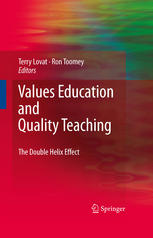

Most ebook files are in PDF format, so you can easily read them using various software such as Foxit Reader or directly on the Google Chrome browser.
Some ebook files are released by publishers in other formats such as .awz, .mobi, .epub, .fb2, etc. You may need to install specific software to read these formats on mobile/PC, such as Calibre.
Please read the tutorial at this link: https://ebookbell.com/faq
We offer FREE conversion to the popular formats you request; however, this may take some time. Therefore, right after payment, please email us, and we will try to provide the service as quickly as possible.
For some exceptional file formats or broken links (if any), please refrain from opening any disputes. Instead, email us first, and we will try to assist within a maximum of 6 hours.
EbookBell Team

0.0
0 reviewsValues Education and Quality Teaching: The Double Helix Effect reports on the results of two of the major projects in the Australian Government’s Values Education Program. These results point to the fact that Values Education can no longer be seen as marginal to the main role of teaching and schooling nor as a venture merely for religious schooling. In contrast, the results show that Values Education sits at the centre of teaching and schooling wherever it occurs. The importance of Values Education is in its potential to re-focus teachers and schools on their essential purpose, namely the holistic betterment of the students in their care.
The focus of Values Education coincides with the results of research into student achievement that illustrate the vital role played by relationships of care, trust and respect with teachers if students are to ‘do well’ both academically and more broadly. It picks up on a feature of Quality Teaching research concerned with the creation of the positive and supportive learning ambience. It is a feature that can be overlooked in the concern for technique and craft . Yet research tells us that it is this ambience, and especially the positive relationships that are part and parcel of it, that is one of the essential ingredients in student achievement.
Furthermore, research tells us that student achievement is more assured when those values of care, respect and trust that underpin the learning relationship are made explicit in all aspects of teaching and schooling, including in the curriculum. In this sense, Values Education might be described as the ‘other side of the coin’ to Quality Teaching, as its sometimes ‘missing link’or, to borrow from the research fi eld of Genetics, as co-existing with Quality Teaching in a ‘double helix’ relationship. It is this latter description that the authors have chosen as most appropriately describing the results of the studies on which the book reports.